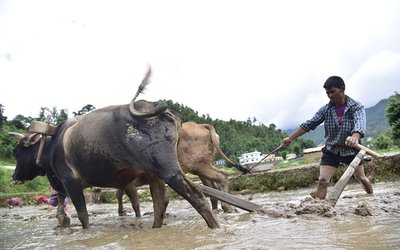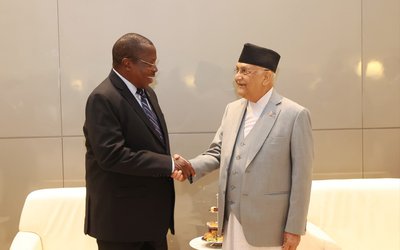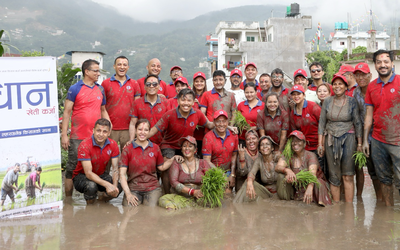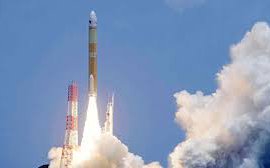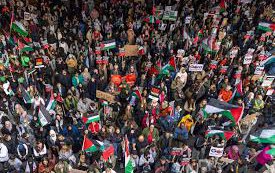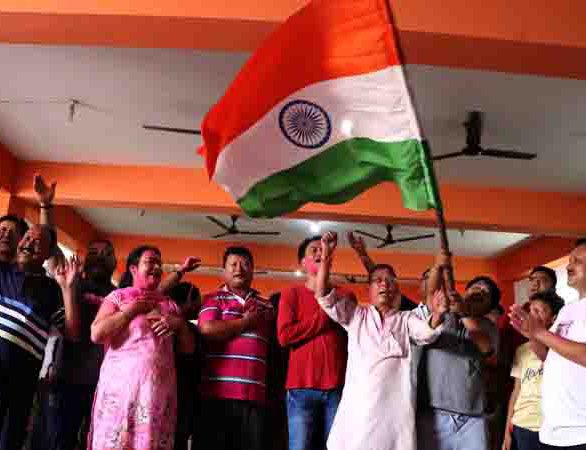
As is said, Kasi, Kashmir Ajab Nepal, every change in Jammu and Kashmir has been influencing Nepal. Following a decision of Indian prime minister Narendra Modi to abrogate article 370, there are speculations in Nepal about the likely implications.
Although abrogation of article 370 and revoking of special status given to Jammu and Kashmir State is internal constitutional matter of India, there are concerns in Nepal as well. This is not one-sided. Nepal's political instability and disorder have implications to Jammu and Kashmir as well.
After the restoration of democracy in Nepal in 1990, Muslim terrorism upsurge intensified in Kashmir and Nepal also saw the arrival of a number of Kashmiri Muslims in different parts. Taking a weak security apparatus and instability in Nepal, Kashmir terrorists hijacked New Delhi bound Indian Airlines IC 814 in 1999.
With abrogation of article 370, one cannot rule out the possibility to see terrorist elements entering Nepal from Kashmir through open border. As Nepal is in the process of restructuring of state institutions, including Nepal Police from local, province and center, there will be a likely new security apparatus in Nepal.
Although Nepal Army and Armed Police Force have retained their central command system, Nepal Police, which has a wide public contact, may have several different commands and control systems.
However, breaching any security in Nepal will be highly risky. The new federal structures in Nepal require bifurcation of the old police systems with new institutions, one cannot rule out the possibility of breaking down of internal security order.
"Nepal needs to strengthen internal security system including command and control and intelligence and Nepal Army needs to be very watchful of internal situation to prevent any unwanted incident from Nepali soil to harm its neighbor," said Binoj Basnyat, a security expert and retired Major General of Nepal Army.
Others too agree. "Muslim guerrillas and terrorists may take Nepal as a shelter and training ground as Osama-bin Laden had done in Afghanistan and Somalia and Philippines. Nepal Government has exhausted and destroyed its security apparatus to serve them like their loyal servants. Today you must salute all guerrilla fighters of yesterday to save your job and good career with whom you were fighting tooth and nail," said former AIGP of Armed Force Rabi Raj Thapa.
Nepal's Connection
There are large numbers of Gorkha community, almost 100,000, living in Jammu and Kashmir since a long time. Their ancestors had shifted to Jammu and Kashmir from Nepal decades ago to fight alongside the erstwhile Dogra Army and even now most families boasted of at least one war veteran.
Along with other communities, the Gorkha community living in Jammu is upbeat since the government scrapped provisions of Article 370 as they feel they will now get permanent resident certificates which will allow their children to apply for jobs and seats in professional courses of their choice.
"The decision of the central government came as a big relief for us as our dream is finally getting fulfilled after a long and painful wait," Sher Bahadur Rana, 81, a war veteran, told PTI at his residence in the thickly populated Gorkha colony near Bahu Fort.
According to reports, there are around 100,000 families of Gurkha living in various parts of Jammu and Kasmir, deprived of the rights since last 150 years.
"I was not sure that I would hear this good news in my lifetime... But I still don't believe that our miseries will end," the octogenarian said in a choked voice as he recalled the contribution of his forefathers who came here from Nepal on the request of the Dogra dynasty which enjoyed friendly ties with the king of Nepal.
Rana said he was born in Srinagar in the royal palace of the last Dogra ruler Maharaja Hari Singh as his father was in his Army and posted there. "We relocated to Jammu in 1947 after the attack by Pakistani raiders. My father had gone to fight them," he said.
The Army veteran said he later also joined the Indian Army and retired from the service in 1978. Later his son followed in his footsteps and served the country. He said in 1990 many Gorkhas had "left Kashmir due to the rise in terrorism there".
Thanking Prime Minister Narendra Modi for the historic decision, he said, "Our ancestors came as a fighting unit for the Dogra ruler and settled here. I have never been to Nepal, neither have most of the others from my community. It pains me when we are told you do not belong to this place".
Kishan Bahadur (70), also an ex-serviceman, said the development has sparked a ray of hope among the community that the future of their children was safe in the country.
"If we return to Nepal today, nobody is going to take us back as we don't know the place and the people there. We have been here for generations and have faced every situation with determination," said Bahadur, who had taken part in three wars -- the 1962 war against China and the 1965 and 1971 wars against Pakistan.
He said his father Padam Bhadur had taken part in 1947 war, while his son Mann Bahadur joined the Army after the Kargil war was over.
Bahadur said that had the politicians from Kashmir "done justice with those living in the state for decades, such a thing would not have not happened. The history is witness to our sacrifices for the state and the country."
President of Jammu and Kashmir Gorkha Sabha, an organization fighting for the uplift of the community, Karuna Chatri, claimed that "95 per cent of over 500 families have at least one former soldier".
She said that from now on they are going to celebrate August 5, the day the Centre revoked provisions of Article 370, as a festival. On the challenges faced by community members, Chatri said only a handful have permanent resident certificates, leaving their children to suffer.
"After the abrogation of the special status, now our children can get selected in government jobs as well," she said. Gorkha Sabha youth president Manish Adhikari said his dream to don an Army uniform and follow in the footsteps of his father and brother remained unfulfilled.
"I passed the written test for Indian Air Force but was dropped because I could not produce the permanent resident certificate of Jammu and Kashmir," Adhikari, who now runs a fast food business, said.
"It’s an irony that a talented sportsman from Jammu, Sager Sahi, who was in the team which won a gold medal in fencing in the Commonwealth Games in Australia was denied a job in Jammu and Kashmir Police because he did not have a permanent resident certificate.
"He later joined the Army under sports category and is serving the country," he said, adding his brother Kishan Adhikari was denied a seat in an MBBS course and he later had to join the Army Medical Corp.
This is the sad case of Gorkha population of around 100,000 who became part of the Dogra king’s army of Kashmir 170 years back. Shockingly, they are deprived of basic human rights by State Government of JK in the garb of Article 35A. They have no right to vote in local elections of state, government job & social welfare benefits. Their children are denied admission in professional colleges.
A retired Gurkha Army officer wrote a letter to the governor of Jammu Kashmir, complaining, “We are residing in Jammu and Kashmir right from the beginning of the Dogra Regime in 1846. The large population of people, whose beloved ones fought for the Jammu & Kashmir Maharaja, now live in the most inhuman of conditions. After more than 70 years of independence, we are still denied the status of permanent residents of Jammu and Kashmir, and are victims of social and economic discrimination. We are discriminated against in the matter of securing government jobs even though we have the requisite qualification. We have become bonded laborers in the State confined to watchman duty, a slavery of a sort. To crown it all, the State has, contrary to national and international human rights law, thwarted any mechanism or procedure for us to achieve our fundamental rights, by implementing a farce called “Permanent Resident Certificate”.
"Thus, Articles 370 and 35(A) had dehumanized the lives of a million citizens of India. I hope this small note will open the eyes of champions of these highly unjust provisions of the Constitution," a Gurkha family said.
Nepal's Spiritual Importance
Even before the unification of modern Nepal, people from princely states of Nepal travelled to Jammu and Kashmir. For Nath and Aghor sect, Kashmir is known for the place of origin. Along with Chandannth, rice and apple in Jumla come from Kashmir.
In terms of religious and spiritual purposes, Jammu and Kashmir has its importance. However, this relation has somewhere gone missing between the two regions after upsurge of Muslim and demise of Hindu King and Kashmiri Pandit. The imposition of many conditions under article 370 to Indian citizens also bar Nepalese.
Hindu community in Nepal as well entire subcontinent chants Jambu Dwipe, Bharatbarse it performs spiritual practices at home including appeasing ancestors.
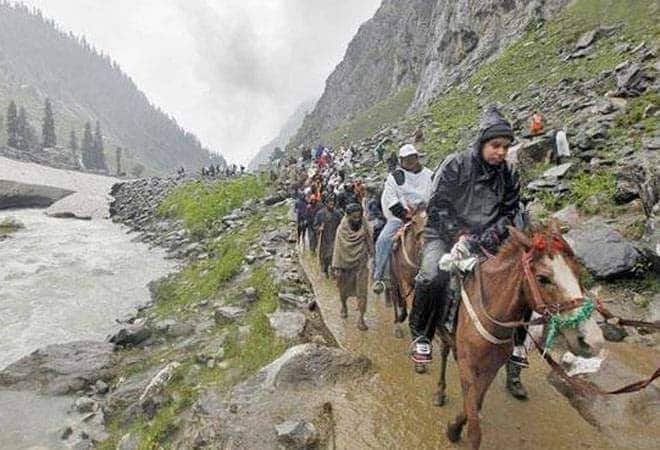
On the way to Amarnath
Legends of Jammu and Kashmir's origin and stories of early times are recorded in Pandit Kalhana's Rajatarangini (River of Kings).
The genesis of Kashmir is contained in a Hindu legend, which states that the valley was a lake, hundreds of feet deep, named after Satidevi. She is the most venerated deity in Kashmir. The lake became the abode of the guardian Nagas, or snakes, from which many places in the valley, such as Anantanag, Verinag and Ernag, got their names. Hari Parbat, Bramulla were some of the spiritual places even connected with Shaivaits.
In Kathmandu Valley, traders from Jammu Kashmir regularly were the sources of cloths which Kathmandu supplied to Tibet. They traded all kinds of products with Nepal.
Mixed Response
Although overwhelming majority of common Nepalese citizens have been silent on abrogation of article 370 of Indian Constitution, a group of intellectuals and politicians, who claim themselves as champions of secular, federal and republic Nepal, have been expressing dissenting voices against PM Modi Government's decision.
Although PM KP Sharma Oli led government is also watching in silence, the groups are feeling an unknown uneasiness in Nepal from India's possible move.
In social media, broadsheet newspapers, intellectuals and politicians are expressing panic statements fearing that India's Narendra Modi led BJP government reverses its stand on Nepal.
Lots of literature have already been written how New Delhi that brokered the 12-point agreement of 2005 between seven party alliance and Maoist rebel for a new system in Nepal. Many persons know that the deal was signed in 2005 but it took shape during the rule of late Atal Vihari Bajpyuee led BJP government.
Whether former prime minister and Maoist ideologue Dr. Baburam Bhattarai, former NC leader JP Gupta, prolific writer, and champions of identity politics like CK. Lal, Hari Roka and Rajendra Maharjan or prominent civil society leader Dr. Devendra Raj Pandey, all of them have expressed dissenting voices in twitter or media against abrogation of article 370. "India has 370 Article but one person’s signature, oh!," twitted Dr. Pandey.
In his article in Nayapatrika Daily, former Member of Constituent Assembly nominated by erstwhile Maoist party warns that BJP's decision is a threat to Nepal's current system, urging government to stand for Kashmiri people and their rights.
Senior journalist Kishor Nepal too expressed his views on tweet saying Kathmandu's intellectual communities are lost on Kashmir issue. No body is speaking. It might not be the reason for a visit of Jaishanker.
In an article in Kantipur on August 14, intellectual championing identity based and secular, federal and republic Nepal, CK Lal, was also critical of BJP hitting Modi government, pursuing religious agenda like in Germany, during the Nazi period. In another article on Kantipur on August 14, former sympathizer of communist party and now champion of identity politics Rajendra Maharjan even compared BJP as a Nazi party and Prime Minister Narendra Modi as Hitler in the context of abrogating the article 370.
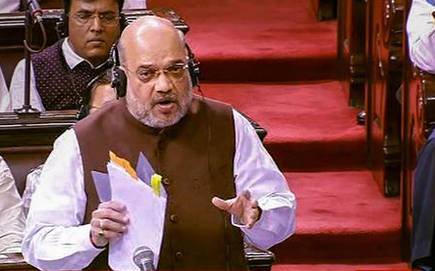
Home Minister Amit Shah
All leftist and champions of identity based politics are urging all secular and progressive forces in Nepal to resist any likely move of India to reverse Nepal's current constitutional dispensation.
Maoist ideologue and former prime minister Dr Baburam Bhattarai twitted saying that progressive force should not be late to understand the rise of rightists, religious fundamentalist single cast Fascists and Nazi's new faces in globally, in neighborhood and our own country.
In media sector, The Kathmandu Post, Kantipur and Nepali Times in their editorial questioned the abrogation of article 370. In its editorial The Kathmandu Post writes of Draconian measures in Jammu & Kashmir.
Nepali Times, Nepali English weekly, in its editorial writes the other factor that should engage the minds of Nepal’s rulers is that a BJP government that could overturn India’s own Constitution on Kashmir for populism could attempt a reversal of Nepal’s secular constitution.
"Nepal’s secular constitution is the result of a ten-year war and a decade of instability during which Nepal nearly got sucked into a multi-ethnic internal conflict. If our neighbors want a stable Nepal, they should not tamper with this reality."
“Kashmir is a seventy years old issue, with many roots. The abrogation of article 370 is just an internal matter of India, which denied special privilege given to Jammu and Kashmir. The status of Kashmir was even less than Sikkim. There is nothing that went wrong. China issues statement limiting its own border and Pakistan has to oppose,” write Dhruba Hari Adhikari.
"Interpretation of Kashmir issue is not correct. As per the rules of partition which Pakistan insisted and India agreed was that King Hari Singh was the sole authority in joining either India or Pakistan. Pakistan attacked Kashmir in 1947, and there was the naked dance of loot and rape. All the nuns of the Church in Baramula were raped to death. Thus, King had no choice but to join India. His accession, of whole Kashmir, was final. Pakistan is for Muslims, India for all," said Tilak Shrestha, who has been writing on various political issues. "For India it was a matter of national prestige all along since 1947 after the partition. Now the Indians are enjoying their euphoric days in the aftermath of abrogation of article 370."
Security Concern
During the British Empire in India, Ranas completely assured their security in their northern frontier and justified Nepal's existence as an independent nation to handle all the matter by itself.
According to prominent British Historian Alastar Lamb in his Book, British, India and Tibet, he said that out of three Eastern Himalayan States, Nepal had shown an exemplary model to be a buffer state.
Due to Nepal's capacity to provide blanket security to British India, Nepal received a much flexible treaty even in 1923 compared to Bhutan and Sikkim. British made Sikkim a total protectorate state but they left Bhutan and Nepal independent to take decisions.
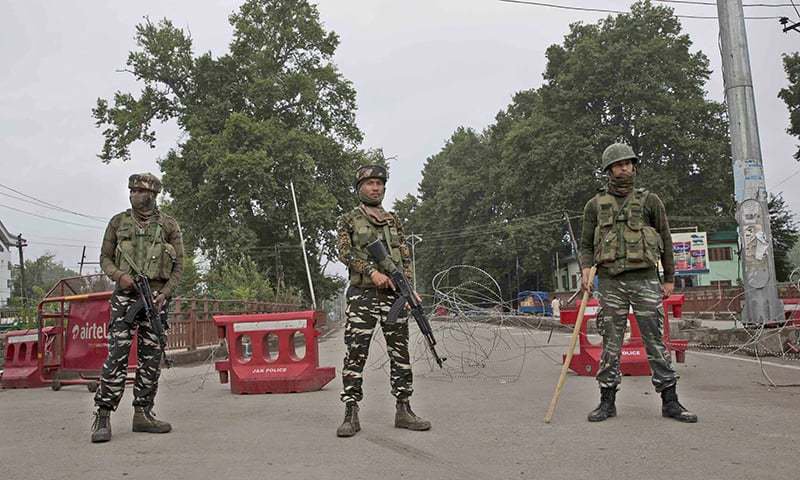
Given the current situation with large numbers Muslim population , with wider exposure to Gulf states, concentrated in southern border, Nepal needs to strengthen its own security to assure Nepal's southern neighbor that it is capable to prevent any possible misadventure by unwanted elements from Nepal.
As Nepal has been passing through a turbulent period with restructuring of security system at national, provincial and local levels and with administrative changes, there are many vulnerable points.
“Now every Indian can say confidently 'One Nation, One Constitution,” thundered Prime Minister Narendra Modi addressing the nation on 73rd Independence Day from Red Fort after successfully removing Article 370 as election pledged. This will also open road to Nepal to renew connections.

Keshab Poudel
Poudel is the editor of New Spotlight Magazine.
- FOURTH PROFESSOR Y.N. KHANAL LECTURE: Nepal-China Relations
- Jun 23, 2025
- Colonel JP CROSS: Centenary Birthday
- Jun 23, 2025
- REEEP-GREEN: Empowering Communities with MEP
- Jun 16, 2025
- BEEN: Retrofitted For Green
- May 28, 2025
- GGGI has been promoting green growth in Nepal for a decade: Dr. Malle Fofana
- May 21, 2025




